Moodle Roadmap Plug-In: Developed at NC State and Available to the World
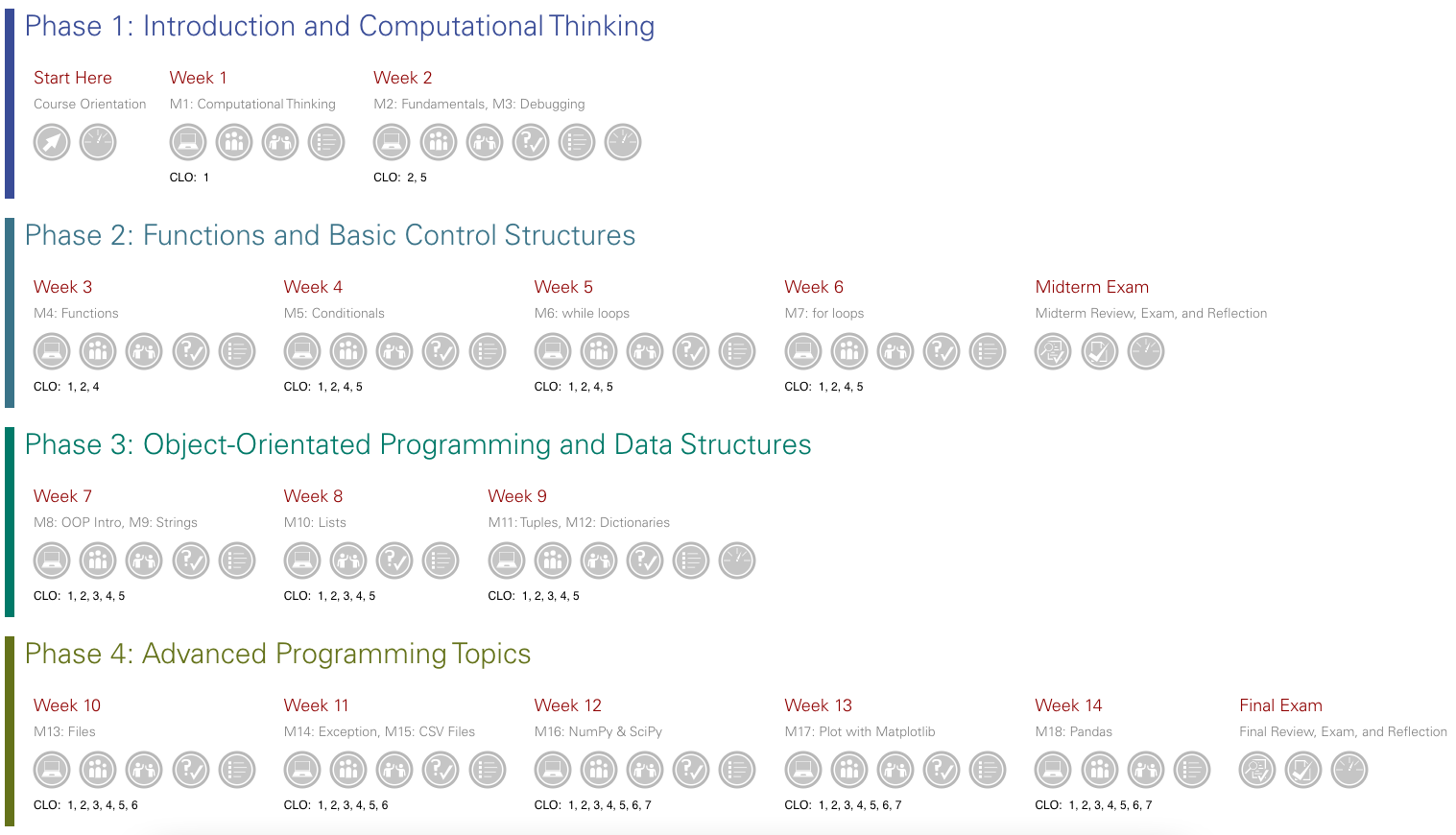
Many universities recognize the benefits of gamification that use points and badges to incentivize students to learn. Now, a Moodle Roadmap plug-in has been developed by DELTA to enable game-like features in Moodle with a low learning curve, and more importantly, to enhance student success through self-regulation. This tool is available to all instructors through Moodle 4.0 course space and project space.
“I think the Roadmap was imperative to my success in this course. I don’t think I would have been able to do as well as I did without being able to see how many things I needed to do, how long I had to complete my assignments and see the pace of the course,” an anonymous student from a physics course in summer session 2021 said.
Mission accomplished! The Roadmap plug-in was designed to foster student success in a visually appealing fashion. It helps students closely monitor their learning progress, thereby prompting them to plan for and reflect upon their learning — these self-regulated learning skills are essential to success in college classes.
But wait, there’s more. Preliminary findings from courses using the pilot version of the Roadmap plug-in (PY 131 Conceptual Physics and PY 211 College Physics in Fall 2021) showed 87+% students found the roadmap helpful for monitoring their progress and keeping up with the learning activities. And, 70+% of students enrolled in those courses enjoyed their experience so much that they would like to see it used in their other courses.
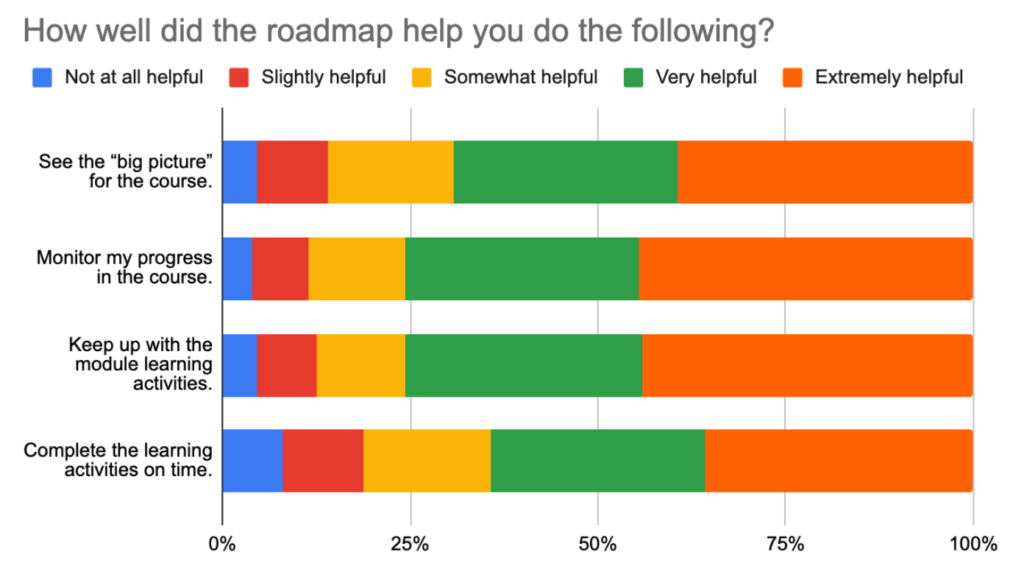
In addition, statistical analysis showed that the roadmap achievements, particularly the on-time completion rewards, can predict course grades to some extent even when controlling for GPAs. This means that for students starting with similar GPA levels, those who earn more on-time completion rewards are more likely to achieve higher grades at the end of the course.
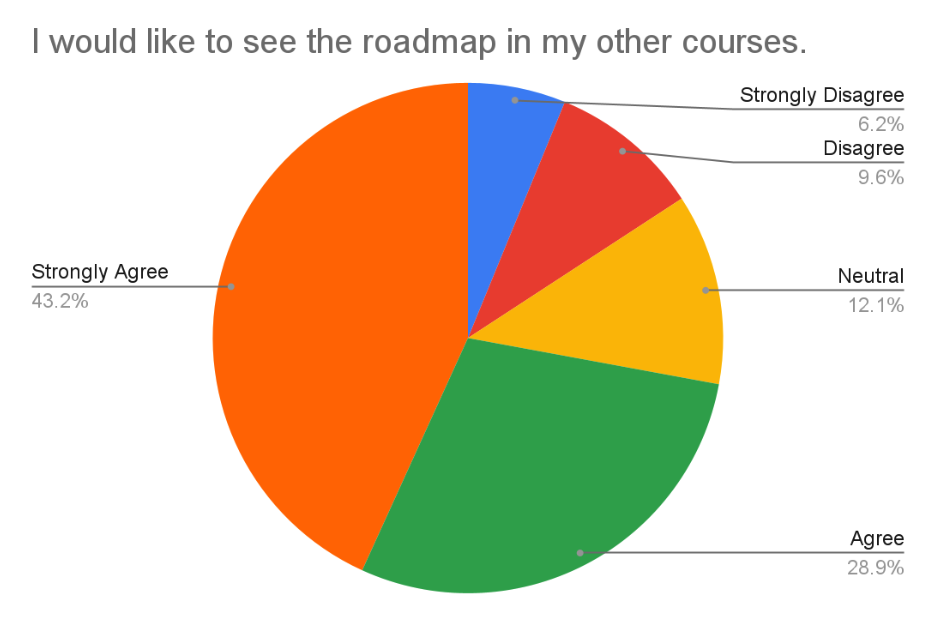
How Does It Work?
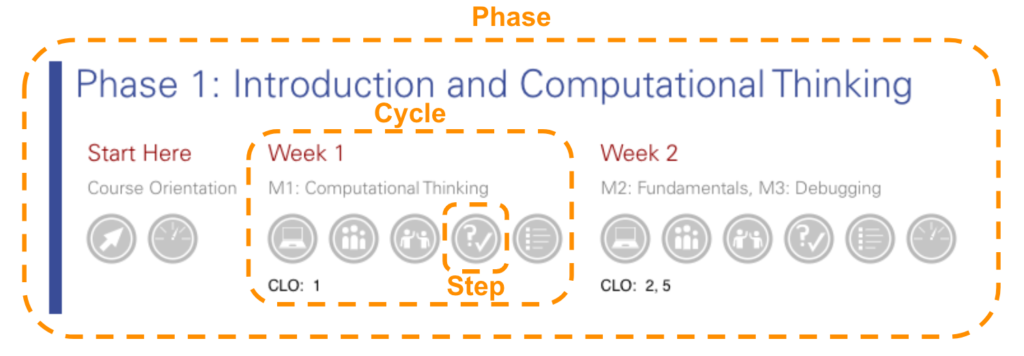 This tool allows instructors to organize their class into three levels — Phases, Cycles and Steps. Phases represent large segments of the course based on topics or tests/exams. Within each Phase, the learning units (modules, weeks or days) become Cycles that students are directed to complete in order. Steps are the individual or groups of learning activities students complete within each Cycle — they represent a recommended, specific order of learning events. While it is easiest to develop the Roadmap after all the course activities are set up in Moodle, it is best to be planned during the course design process.
This tool allows instructors to organize their class into three levels — Phases, Cycles and Steps. Phases represent large segments of the course based on topics or tests/exams. Within each Phase, the learning units (modules, weeks or days) become Cycles that students are directed to complete in order. Steps are the individual or groups of learning activities students complete within each Cycle — they represent a recommended, specific order of learning events. While it is easiest to develop the Roadmap after all the course activities are set up in Moodle, it is best to be planned during the course design process.
Since each step icon is tied to one or multiple Moodle activities, students can easily track their progress with the icon status. When multiple activities are required for achieving a step icon, the students see a progress ring surrounding the icon fill in progressively as they complete their work. Once everything is completed, the default gray icon transforms into a colored icon — if done by the expected completion date set in the roadmap — they get a gold star!
The Moodle Roadmap User Guide provides step-by-step instructions on how to set up a roadmap as well as the best practices developed from the pilot findings.
Who Uses This Tool at NC State?
Teaching assistant professor Shuyin Jiao, who received a Critical Path Course Redesign grant in 21-22, is currently using this tool in her CSC 111: Introduction to Computing – Python course for the first time (see the featured picture of this article). Yet, there are a number of instructors who have been using this tool since an earlier time when the tool was still being piloted.
Teaching Professor Keith Heyward began using this tool during the summer of 2021 in his PY 211: College Physics I course. When he and three other colleagues applied for a DELTA Course Design Grant, one of their goals was to find a structured, user-friendly tool to effectively guide students through the course content in a structured manner. By using the Roadmap, students received confirmation that they were completing the activities associated with each learning objective on-time and in the required order.
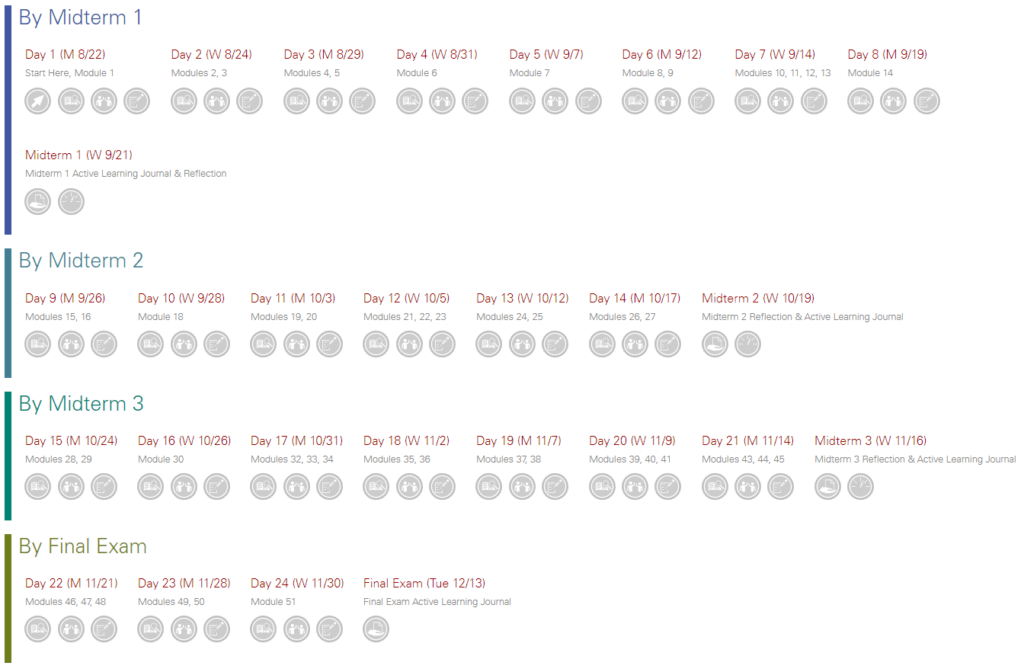
“Completing the activities in order and on time is critical to students’ success in the course. Each topic in the course commonly builds on previous topics. So, if students are not proficient at a given topic, it often impedes their ability to become proficient at future topics. The Roadmap helps students to visually see their progress and it also helps them to plan for upcoming activities,” said Heyward.
Lead Instructional Designer Yan Shen suggested the use of the Roadmap tool in PY 211. She collaborated with fellow DELTA team members Associate Director of Open Source Applications Stephen Bader, Lead Interaction Designer/Developer Ben Huckaby, Multimedia Development Team Lead David Tredwell, and Online and Distance Education Research Scholar Dan Spencer in designing and developing this tool over three years.
“Throughout the use of the Roadmap, especially during the learning curve of the initial implementation, Dr. Shen was very responsive and hands-on. Simply put, the Roadmap would not have been implemented in the course without the guidance and ongoing support of Dr. Shen and supporting staff at DELTA,” explained Heyward.
Even though setting up the Roadmap in Moodle is not difficult, Heyward recommends setting aside a fair amount of time to complete this process prior to the start of each semester. He believes once students begin using the tool, instructors see many benefits.
“The Roadmap helps students to understand the expectations the instructor has of them. This, in turn, reduces the number of logistical questions students may ask the instructor. With this guidance, students also appear to be learning the material better. And, this reduces the number of content questions students frequently ask the instructor, prior to using Roadmap,” he said.
Heyward recommends colleagues consider incorporating Roadmap into their courses. In particular, the ones in which mastery of material in one unit is imperative for success in the following unit. Student success increases when they feel empowered to self-regulate their academic journey.
How Do I Convert A Traditional Lecture Course?
Senior Lecturer Elizabeth Dempster wanted to redesign her traditional lecture-style courses into “boot camps” for Calculus. DELTA helped her transition and streamline her Math 111: Precalculus Algebra and Trigonometry through a Critical Path Course Redesign grant to enhance student success. Dempster noted most students no longer read the class syllabus — let alone take the time to set up their own calendars. So, she was searching for a user-friendly tool to guide them through the course content. Her project became one of a few course redesign projects that inspired DELTA to create the Roadmap tool.
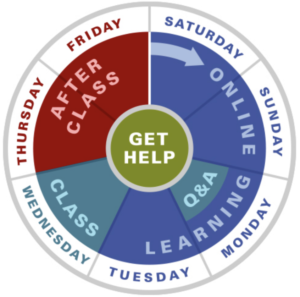
“While I still love the traditional classroom setting, I now understand the tremendous benefits of putting some short lectures and other assignments online for the students to do independently before and after the “in-person” classroom time. Mallory McMahon was a Ph.D. graduate student who also saw the need to redesign the course so we worked together with DELTA to transform and reorganize the material. Lecturer Brittany Riggs, who was a Ph.D. student at the time, worked with us the second year of the redesign,” Dempster explained.
The students enrolled in this class have to master the basic skills before they can be expected to attempt and master the difficult, more interesting applied type of problems. After the redesign, the MA 111 students complete weekly skills type assignments — watch videos, take Moodle assessment quizzes and do preliminary WebAssign assignments — then come to class to work in groups on the harder, more applied problems.
“They seem more engaged in their classroom work when they’ve successfully completed their online independent work prior to class. The Roadmap makes these expectations very clear. The structure and expected pace provided by visually seeing the due dates, working sequentially to check them off and getting gold stars for doing them on time, all reinforce the behavior we want to encourage,” added Dempster.
She gives credit to Shen for “helping to get the scattered ideas from paper to implementation” and “kindly understanding” when she needed help because she felt overwhelmed with the process of teaching classes, making videos and doing course design work.
“Yan Shen was truly wonderful! We finished before the COVID-19 pandemic. And, it made the transitions to all online (Zoom) classroom meetings — then back to blended online, Zoom, and classroom meetings last year easily possible. I just can’t imagine having to go through the pandemic without all the materials that Yan set up for us. She provided support each semester and kept everything working. DELTA provides an incredible overall resource for the NC State faculty and Yan is a star in their office! I always sing her praises whenever I have an opportunity to do so,” Dempster said.
She believes interactive tools such as Moodle Roadmap are the new way students “read” and understand their course expectations. They no longer choose to download the “boring” syllabus PDF. Instead, they want to virtually jump right into the course and start working. Roadmap offers the “big picture” broken down into cycles which include steps and due dates. The expectations are clear and visual.
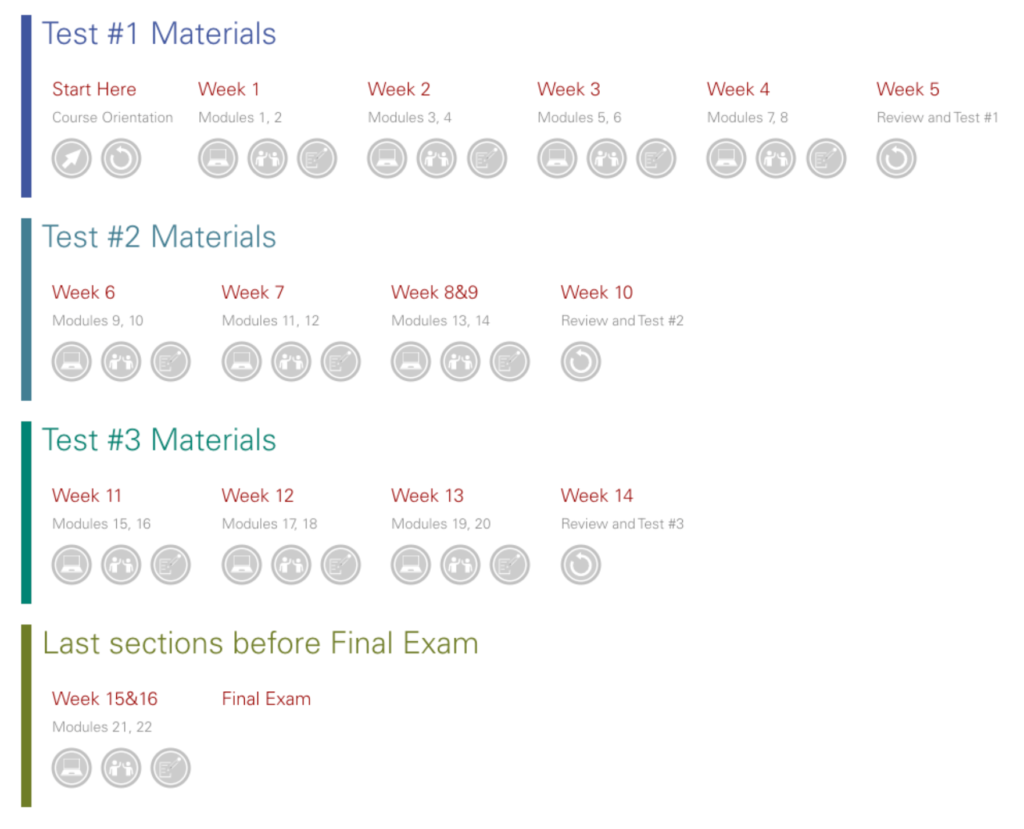
“I tell the students since they expect me to show up to class ready to teach, it only makes sense that I expect them to show up to class ready to learn. They have to do their part to be ready to engage with me and their peers. It makes class much more fun when they show up prepared to collaborate. They ask good questions and challenge both the teacher and their peers to think more deeply,” she added.
Dempster highly recommends implementing the Roadmap plug-in because she believes it helps students comprehend the course in its entirety while providing a visual navigational tool to keep them on track and show their progress.
What’s Next?
The Moodle roadmap plug-in team from DELTA is presenting this tool at the UNC CAUSE, Global Moodle Moot, and OLC Accelerate conferences this year. The plugin will be made available to the Moodle community in the near future. The roadmap tool will be covered in the upcoming DELTA Moodle workshops.


